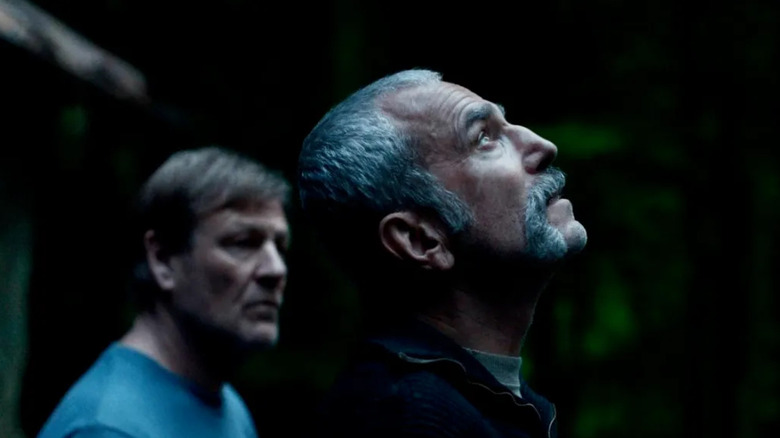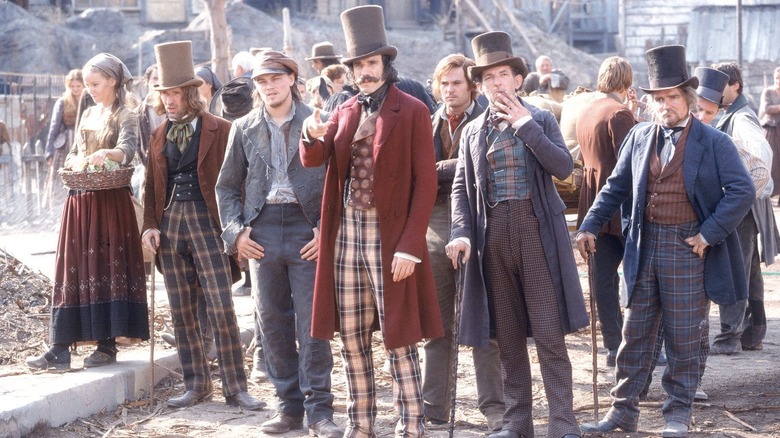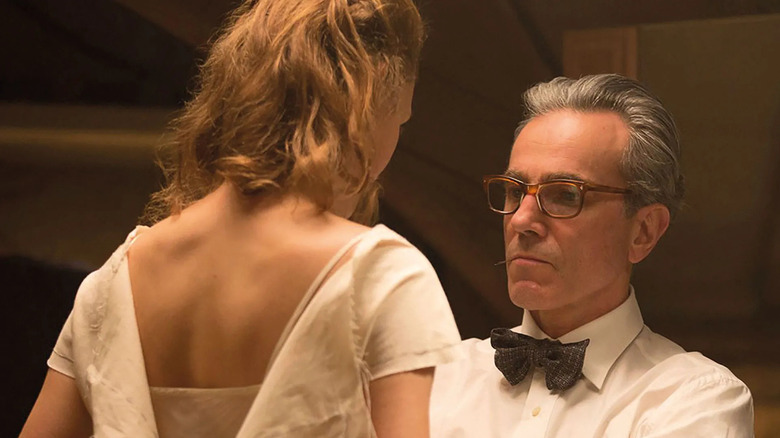How Daniel Day-Lewis Really Feels About Actors Who Go 'Full Method'
Some of Hollywood's greatest performers of the past 75 years have counted themselves as Method actors: Paul Newman, Marilyn Monroe, Dustin Hoffman, Al Pacino, and Jack Nicholson all studied under Lee Strasberg, while the likes of Marlon Brando, Robert De Niro, and Warren Beatty all learned the technique from Stella Adler. Yet despite Method's sound principles, more extreme examples have made it almost a by-word for pretension and self-indulgence — just ask Jared Leto's fellow cast members in "Suicide Squad." Today, Daniel Day-Lewis is arguably the most talented advocate of Method acting, and he has some serious thoughts on the subject.
This year, the three-time Oscar winner returned to the screen for the first time since "Phantom Thread" in 2017 to star in "Anemone," the directorial debut of his son, Ronan Day-Lewis. He granted a rare interview to the New York Times, and naturally the subject of his craft and Method acting came up. He responded:
"I don't really like thinking of acting in terms of craft at all. Of course, there are techniques you can learn, and I know that the Method has become an easy target these days. I'm a little cross these days to hear all kinds of people gobbling off and saying things like 'gone full Method,' which I think is meant to imply that a person's behaving like a lunatic in an extreme fashion."
The comment about people "gobbing off" is about as confrontational as Day-Lewis usually gets, perhaps because he's one of the most high-profile actors still using the Method as it was intended. Yet over the decades he has provided plenty of anecdotal evidence for those who enjoy taking that "full Method" stance.
How Method acting became a punchline
It's probably worth backtracking to define what people mean when they say an actor has gone "full Method" as opposed to just using Method acting techniques. Adapted from Konstantin Stanislavski's system by Lee Strasberg and Stella Adler in the mid-20th Century, students were encouraged to delve into their personal experiences to create an emotional connection with a character and portray an authentic range of emotions. Over the years, some actors have taken Method acting to extreme lengths, as summed up by the well-known anecdote about Dustin Hoffman in "Marathon Man." The actor stayed awake for 72 hours straight to convincingly play the sleep-deprived protagonist, prompting the droll response from his co-star Laurence Olivier: "My dear boy, why don't you just try acting?"
Further stories about the lengths that some actors will go to immerse themselves in their characters has turned going "Full Method" into a bit of a showbiz punchline, culminating in Robert Downey Jr. receiving an Oscar nod for his controversial turn as Kirk Lazarus in "Tropic Thunder," a smug Method actor who undergoes "pigmentation alteration" to play an African-American soldier and doesn't break character until the DVD is released.
Elsewhere, Method acting has yielded some of the greatest performances of all time: Al Pacino in "The Godfather," Robert De Niro in "Raging Bull," Heath Ledger in "The Dark Knight," and just about any Daniel Day-Lewis turn you care to choose. Since the Method arguably reached its peak during the New Hollywood movement in the '70s, acting in general has trended towards the naturalistic, with only a few mavericks like Nicolas Cage forging courageously in the opposite direction.
Daniel Day-Lewis's adventures in Method acting
Daniel Day-Lewis's first major foray into "going full Method" came when he landed the lead role in "The Unbearable Lightness of Being." Rather than just mimic a Czech accent, he decided to learn the (incredibly difficult) language fluently so his performance would have a "kernel of truth" despite speaking English throughout the film. The following year, he insisted on staying in character as cerebral palsy-sufferer Christy Brown in "My Left Foot," asking crew members to feed him and carry him around the set.
Apparently no discomfort or hard work is too great in the actor's quest for authenticity. Among other examples, he spent a few months living in the woods in readiness for "The Crucible;" caught pneumonia because he refused to wear a historically inaccurate coat on "Gangs of New York;" and took a year's apprenticeship in dressmaking for "The Phantom Thread." Day-Lewis further summed up his approach in the New York Times interview:
"Everyone tends to focus on the less important details of the work, and those details always seem to involve some sort of self-flagellation or an experience that imposes upon oneself a severe discomfort or mental instability. But of course, in the life of an actor, it has to principally be about the internal work."
The skeptical viewer might echo Laurence Olivier and question why he doesn't just "try acting" instead, but there is little doubt that Day-Lewis' intense preparation and dedication to his roles has made him one of cinema's true greats. You can't argue with three Oscar wins from six nominations and, now he has returned to the screen once more, you probably wouldn't bet against him Methoding his way to another.


